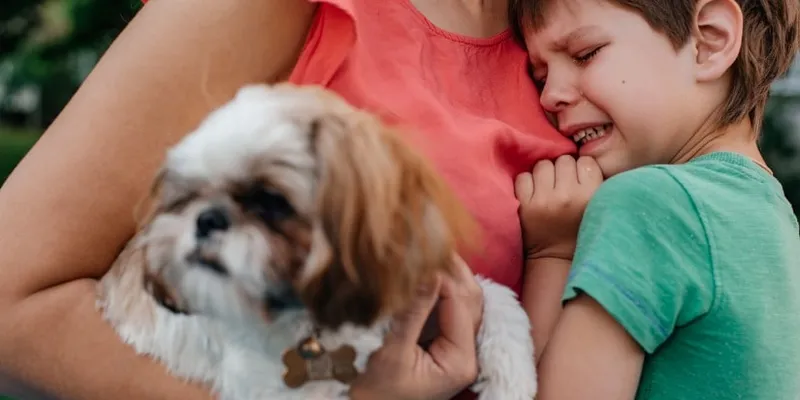When Does Separation Anxiety Become Worrisome?
Learn the symptoms of separation anxiety, why it can become a disorder, and how to treat it.
- 3 min read
- child development
- custody

Separation anxiety in children
Separation anxiety is when anyone—young or old—fears or stresses about being separated from someone, something, or even a pet. For children, separation anxiety usually revolves around separation from a parent. Children often experience separation anxiety as they undergo significant developmental changes in the first several years of life. Typical symptoms of separation anxiety in children include:
- Feeling fearfulness or nervousness when away from home or separated from a parent
- Clinging to parents
- Crying
- Experiencing physical symptoms, such as headaches or stomachaches
- Bedwetting
- Having temper tantrums
- Refusing to go to school or daycare
- Refusing to sleep alone
- Having nightmares that involve separation
Separation anxiety is a normal part of childhood development, so it is generally discussed more in children than adults. Children ages 8 to 14 months especially experience this. Separation from a parent typically causes an infant to experience distress. This reaction can manifest in infants crying when they realize they have been left alone. Surprisingly, distress and separation anxiety in infants can indicate that your baby has a secure attachment with their parents.
As babies grow into toddlers, they explore the world around them and test their independence. However, their innate survival skills remind them to keep their parents close for protection and well-being. Toddlers are still learning how object permanence applies to people, so it takes time for a toddler to understand that someone who leaves will likely return later. Indicators of separation anxiety usually subside in children around 4 to 6 years of age.
When separation anxiety becomes a disorder
Separation anxiety is not an issue unless it becomes prolonged or severe, persists past age 6, or starts interfering with daily activities. If a child continually experiences symptoms of separation anxiety, those symptoms may have progressed into a disorder. According to the Mayo Clinic, symptoms of separation anxiety disorder in children include:
- Constant, excessive distress about being away from home or parents
- Persistent worry about losing a parent from an illness, accident, or disaster
- Refusal to leave home or stay at home without a parent in the house
- Refusal to sleep away from home
- Repeated nightmares about separation
- Panic attacks
- Frequent complaints of headaches, stomachaches, or other ailments when separation is anticipated
- Refusal to go to school
- Failure to interact healthily with other children
Separation anxiety disorder can be associated with panic attacks and panic disorder. These panics involve repeated, sometimes long instances of a child feeling intense anxiety, terror, or fear.

Triggers
Certain factors and life events can contribute to a child developing separation anxiety disorder. In some cases, genetics and a family history of mental illness may play a role in a child developing the condition. Most commonly, it can be triggered through stressful life events involving a child’s separation from a loved one, such as:
- Illness
- Death
- Loss of a pet
- Divorce or separation
- Moving
- Transferring schools
- Disaster or emergency
WebMD also mentions that children whose parents are over-protective may be more prone to separation anxiety. If a parent feels separation anxiety when separated from their child, the child’s separation anxiety can build.
Diagnosis
It is crucial to talk to your pediatrician if you are concerned that your child’s separation anxiety may have progressed into a separation anxiety disorder. Your child’s doctor can perform a complete physical exam to ensure no underlying physical issues or medications contribute to the stress.
Your pediatrician may recommend your child see a psychologist or other mental health professional if there are no physical causes for the separation anxiety. A child psychologist or psychiatrist can give your child a psychological evaluation. This evaluation can include a structured interview where the professional can converse with your child about their feelings and observe their behavior.
Treatment
Treatment for separation anxiety disorder usually involves psychotherapy, also known as talk therapy. One of the most common forms of psychotherapy is cognitive behavioral therapy (CBT).
CBT enables your child to work with a mental health professional in structured sessions. In these sessions, the professional encourages your child to become more aware of their inaccurate or negative thinking tendencies. With assistance from the therapist, your child can learn to view challenging situations with the intent to respond to them effectively. In more significant cases of separation anxiety disorder, a health care professional may recommend the implementation of antidepressants.
Feelings of separation anxiety can heighten if a child’s parents separate or divorce. Your child may struggle with adjusting to a new schedule where they spend less time with both parents. Staying in touch with your child after a separation or divorce is a great way to help combat separation anxiety.
With TalkingParents, co-parents can help reduce their child’s feelings of separation anxiety with our Accountable Calling℠ feature. You can have face-to-face interaction with your kids when you’re apart through video calls or stay connected with phone calls. Accountable Calling℠ keeps all conversations recorded, so whether you need to communicate with your kids or your ex, everything stays on the Record, and you don’t have to share your phone number with your co-parent. With face-to-face conversations through Video Calling, co-parents can give their children the reassurance they need to cope with separation anxiety or whatever they may be going through.